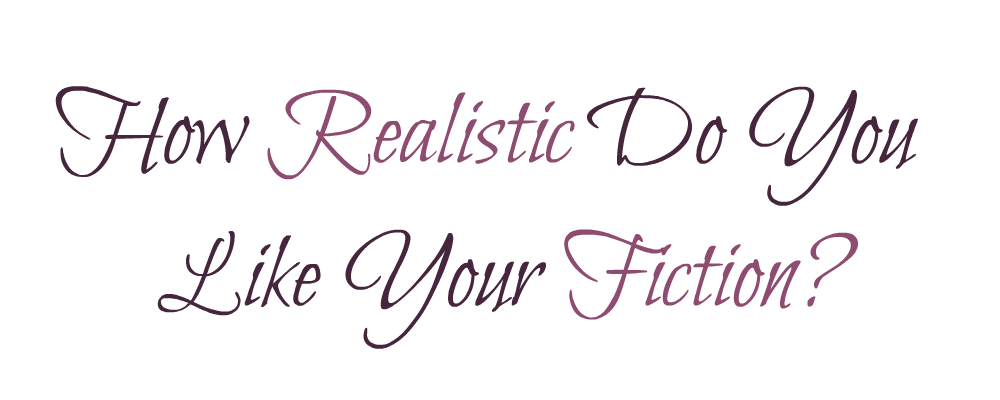I love my fiction books: it’s no secret. But, there is something I’m terribly guilty of, and I think others could feel the same as me: I tend to occasionally throw around the words “unbelievable” and “unrealistic” when I review a book.
That got me thinking: isn’t fiction supposed to be, well… fictitious?
It’s not really supposed to mirror life exactly. It takes the basics we know from our daily lives and puts a complete imaginative spin on it. How can I critique a book by saying I found certain things unbelievable or unrealistic when in fact it’s not supposed to be trapped within the boundaries we have in our lives! (Unless it's tagged "Realistic Fiction". Then that's a completely different argument!)
What do we really mean when we say something in a book is unrealistic?
This will be entirely personal and change from person to person, but when I write that I found something unrealistic, in general I mean I couldn’t imagine the series of events happening in the way it’s described in the book, or I couldn’t see how what happens matches with the mechanics of the world and how I imagined it to be.
I have this little inner-voice that buzzes annoyingly when I type those words and it goes along the lines of “Isn’t this an easy way to gloss over not connecting with a book, without going into detail about why I didn’t like it?” To try to pacify my inner-tormentor, I have tried to get in the habit when I’m thinking about a book to try to explore why I feel certain ways, and if I think something was unrealistic, I try to pinpoint exactly what bothered me. In theory, this is great, but in practice, sometimes I’m left with a jumble of feelings that I can’t distinguish, and in the end using the word unrealistic or unbelievable sums up what I’m feeling just nicely!
Something Believable
It’s not just world building or plots it happens with, but also with the characters in the book. I also have said some are unbelievable, whether it relates to personality or dialogue. But, what the heck do I mean by this? What is bundled together into this one little word? I think it could be narrowed down to one thing: Something was missing. Putting your finger on exactly what that is can be one of the hardest things to do.
You know that moment when you know you've found a new favourite character? That little spark, that moment when you think, yes, finally I found a character I understand, love and can fangirl over? We all know it. Hopefully we've all experienced it. But, how can you put that feeling into words, without sounding like a blubbering fool?!
I think this feeling has something to do with what I personally mean when I say a character wasn't believable. I didn't care or believe in them or their personality enough to hope things work out for the long haul. That word, believable, or unbelievable, can blanket over so many feelings and reasons for disliking or not connecting with a character. The hard part is to find all the words to describe those feeling without a review turning into a novella length book report!
How realistic do I like my fiction?
I like my fantasy books as far from reality as possible; my paranormal books with lots of spooks and imagination; my sci-fi on another planet and contemporary firmly, but gently, shackled in the real world. Yeah, ok, I’m not asking for much am I?
In seriousness though, for me, all roads lead back to the genre.
Genres and Realism
I don’t think I’m alone in thinking that the genre of a book has a great impact on our levels of expectation, and how willing we are to let down our personal realism boundaries. For me, Fantasy and Sci-fi get so much more leeway with what I’m willing to accept and believe in.
Just thinking of those genres alone automatically opens my mind further to accept spaceships, wizards, vampires and countless other imaginary creatures, characters and situations, and that’s before I even open the front cover to start reading! I expect something quirky or different or out of the ordinary to happen. My judgments are relaxed, and I accept these things as part of building a new fictitious world. The challenge I have is applying the same principle to the Contemporary genre.
I subconsciously put more unofficial “rules” on contemporary books, both for the characters and story arc, than I do for any other genre. I look at Contemporary Fiction as a fictitious take on real life. So, at the core of the story, I expect a certain amount of realism. For the most part, my real world boundaries, opinions and limitations will be brought over into the books world. If things are changed around too much, yeah, I can adapt but I find I don’t have the same belief in the story anymore.
I suppose, with contemporary books I expect things to be within the realms of possibility in our own lives, even if it’s not probable that it could ever happen. It’s not particularly fair, but it’s how I end up looking at, and judging, the genre as a whole.


Great topic Alma. I absolutely agree with you on giving sci fi and fantasy more leeway than other genre's. Normally I let a lot of little things go when it comes to fiction, but unbelievable characters drive me crazy. =/
ReplyDeleteMonique @Mo_Books
Oh yeah, unbelievable characters can ruin a book so easily!
Delete